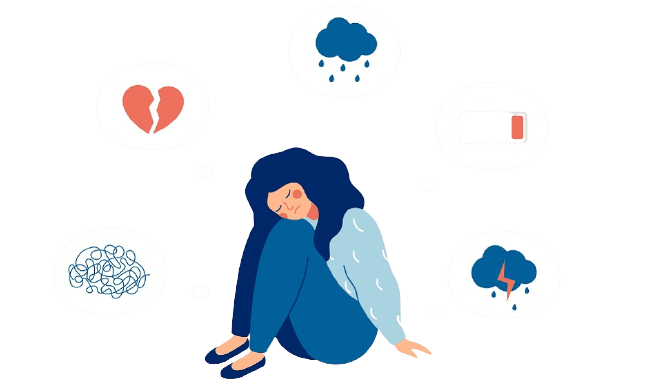Online PTSD Therapy | Best Therapist for PTSD help
- Set up a free & confidential chat on your PTSD Issues
- Unlimited help through PTSD self-care App
- Live Video or Chat sessions with top PTSD Therapists
Begin Therapy
Consult online with best Therapist
Get the best help for PTSD
TherapyMantra is here to help you on your path to recovery from PTSD. We match you with the best PTSD Therapists available 24/7 via video call or messages.
Match with PTSD Therapists
We assign the best counsellors experienced in PTSD issues based on your needs.
Affordable and Effective
Our online sessions are 90% less expensive than in-person therapy, available 24/7.
Self-Care for PTSD
We offer ongoing PTSD support through self-care tools, PTSD help videos, chat groups, meditations, breathing exercises, and other resources.

Wondering if it’s just a phase or something more? Take our Free online PTSD test to find out?
How it works?
You are matched with a PTSD Therapist based on your needs and preferences. You get a secure “therapy room” where you can communicate with your counselor via chat or phone. You can write or talk about PTSD & ask questions to deal with PTSD.

Register for PTSD Counseling
Simply complete a 5-minute online form to tell us about your PTSD issues

Consult with your PTSD Therapist
We connect you with PTSD Therapists who are available 24/7 based on your preferences and needs.

Connect to Our App
Apart from Video/chat sessions, our app offers self-care tools, videos, and meditations to help you deal with your PTSD.
Best PTSD Therapists
Positive conversations, exercises, and meditations are used by TherapyMantra psychologists to help you deal with PTSD. Our PTSD Therapists outperform traditional counseling as you get matched from a pool of 500+ PTSD Therapists, who offer 24/7 unrestricted private chat.








What is PTSD?
Posttraumatic stress disorder (PTSD) is a psychiatric anxiety disorder that can occur in people who have experienced or witnessed a traumatic event. It is a relatively common disorder, affecting around 8% of people at some point in their lives. It can occur after any type of traumatic event, such as a natural disaster, car accident, sexual assault, or combat.
Symptoms may include disturbing recurring flashbacks, avoidance of situations that remind them of the event, and increased arousal. In PTSD, symptoms last for more than a month after the event, and both psychological and behavioral symptoms are present.
PTSD can make it difficult to function normally and can lead to problems in relationships, work, and school. However, with treatment, most people with PTSD can improve their symptoms and live relatively normal lives.
Types of PTSD
The National Center for PTSD lists three main types of post-traumatic stress disorder:
1) Acute PTSD: This is the most common type of PTSD, and it occurs soon after the traumatic event. Symptoms may include flashbacks, nightmares, intrusive thoughts, and a heightened sense of anxiety or arousal.
2) Chronic PTSD: This type of PTSD develops months or even years after the initial trauma. Symptoms may be less intense than the symptoms of Acute PTSD, but they can be just as debilitating.
3) Delayed Onset PTSD: Some people do not begin to experience symptoms until years after the traumatic event occurred. This may occur for several reasons including suppression of memories or feelings associated with the trauma.
Treatment options for PTSD
No one treatment is the best for everyone. It is important to find a treatment that works for you and that you can stick with. If one treatment doesn’t seem to be working, talk to your doctor about trying something else.
There are several different treatment options available for PTSD. The most common treatments are medication and therapy.
Medications
Medication can help lessen the symptoms of PTSD. Several different medications can be prescribed, including antidepressants, anti-anxiety medications, and sleeping pills. It is important to work with a doctor to find the medication plan that is best for you.
Cognitive-behavioral therapy (CBT)
It is a commonly used type of psychotherapy. During CBT, people discuss how to improve their thought patterns and reactions to situations that could be causing the symptoms of PTSD.
Trauma-focused cognitive-behavioral therapy
This type of therapy is specifically designed to help people with PTSD. It includes elements of CBT along with exposure therapy, which helps people to confront their fears related to the traumatic event.
Other Therapies
Other types of therapy are available as well, including exposure therapy, prolonged exposure, EMDR, talk therapy, etc.
How can therapy help with PTSD?
Therapy can help by providing a safe place for the person to talk about their experiences. The therapist can also provide education about PTSD and help to develop coping skills.
It is important to find a therapist who specializes in working with people who have PTSD. This type of therapist will have experience in helping people to manage their symptoms and cope with the trauma.
If you are struggling with PTSD, please seek help from a qualified professional. There is no shame in seeking assistance, and it can be the first step to helping yourself or someone you love.
Therapy options for PTSD
There are a variety of therapy options available for people with PTSD. Some of the most common therapies include cognitive-behavioral therapy (CBT), exposure therapy, and eye movement desensitization and reprocessing (EMDR), etc.
Cognitive-behavioral Therapy
Cognitive-behavioral therapy is a type of therapy that helps people change the way they think about their thoughts and behaviors. People with PTSD can have thoughts about the traumatic event that interfere with their day-to-day lives. Cognitive-behavioral therapy helps people reduce the anxiety associated with their traumatic memories by discussing and changing the way they think about them.
Exposure Therapy
In exposure therapy, people are gradually exposed to thoughts, situations, or objects that cause fear or distress. The therapist uses these encounters as tools for helping a person face their fears until the distress is reduced.
Prolonged Exposure
A type of exposure therapy called prolonged exposure is recommended in the latest PTSD treatment guidelines. Prolonged exposure involves talking about the traumatic event for 60 minutes, twice a week for four to six weeks. Prolonged exposure helps people talk through their symptoms. It also teaches patients how to cope with symptoms when they do occur.
EMDR
During this therapy, patients think about the traumatic event while paying attention to an external stimulus, such as a light or sound. At the same time, they pay attention to their internal thoughts and feelings. These elements are paired together during the therapy session so that it becomes easier for patients to recall unpleasant memories.
Talk Therapy
Talk therapy is a form of counseling that allows people to discuss their thoughts and feelings with a therapist. This type of therapy can be helpful for people with PTSD because it allows them to process the trauma they experienced. It also provides an opportunity for people to learn coping skills.
How to find a PTSD therapist?
TherapyMantra can help you find a PTSD therapist near you. We have over 500+ therapists listed on our therapist directory. You can follow the following steps to find a good PTSD therapist:
- First, ask your family doctor or anyone else you are seeing for a referral for a PTSD Therapist.
- The next thing you’ll want to do is ask your friends and loved ones for referrals.
- The next thing you’ll want to do is look online. Many websites help people find therapists in their area who can treat things like PTSD.
10,000+ Happy & Healed PTSD patients

“Since Therapy Mantra started treating me, my sleep has improved and I had only one intrusive dream in the past four months. My relationship with my wife has also improved. We are now able to communicate better and share more positive moments.”
Kevin,
1 year on TherapyMantra
FAQs
The cause of PTSD is not fully understood, but it is thought to be related to the way the brain processes information about traumatic events. Especially traumatic events, such as rape or combat, may be more likely to cause PTSD.
Currently, there is no cure for PTSD. However, many effective treatments are available to help reduce symptoms and cope with the trauma that caused them. Medication, psychotherapy (also called “talk” therapy), or both can be used to treat PTSD. A type of talk therapy called cognitive-behavioral therapy (CBT) is especially effective.
There are many potential benefits of talking therapy, including:
- Decreased anxiety, depression, and anger
- Improved coping skills
- Increased self-confidence and self-esteem
- Better communication and problem-solving skills
- Reduced stress
- Enhanced mental and emotional well-being
It’s important to talk to somebody if you’re feeling overwhelmed or like you can’t cope with your life. If you’re not sure if you have PTSD, it may be helpful to speak with a mental health professional, who can help determine whether you have the disorder and suggest treatment.
Yes. Therapy can be helpful for many different issues. Most people with PTSD also have other problems that require treatment, such as depression or anxiety disorders. In addition to talk therapy, some people may benefit from medication and support groups. There are several types of group therapy available for people with PTSD.
People who have PTSD have symptoms that last more than one month and disrupt their daily life. Traumatized people may have some of the symptoms of PTSD, but they usually go away within a few weeks.


